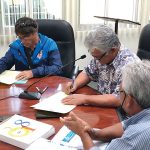Colon cancer: 2nd most deadly, 5th most common

Lt. Gov. Arnold Palacios, center, signs the colorectal cancer awareness proclamation as Commonwealth Cancer Association executive director John Babauta, right, looks on. (Erwin Encinares)
Colorectal cancer in the U.S. is the fifth most commonly diagnosed cancer and is also the second most common causes of cancer deaths for both men and women.
Those alarming numbers underscored yesterday’s proclamation signing, which designated March as the National Colorectal Cancer Awareness Month 2019. Lt. Gov. Arnold I. Palacios signed the proclamation designation.
According to Commonwealth Cancer Association executive director John Babauta, cancer can happen to anybody—anytime, anywhere, and at any age.
“It does not discriminate,” he added.
That makes colon cancer one of the top cancers in the CNMI, according to Babauta. “We want to raise awareness and encourage everybody to do their check-ups and prevention, as well as see their primary doctors,” he said. “These ‘warriors’ also need to be taken cared of.”
Cancer survivor Brett M. Halstead, 52, noted that he has been cancer-free for four months already, as his colorectal cancer was detected early.
“Try to get yourself checked as soon as possible. The age of 45 is probably better for colorectal cancer,” he said.
Halstead credits his early detection for saving his life.
“I found out about it last year, March 24, 2018, through a colonoscopy at the Commonwealth Healthcare Corp. From there, I quit my job and had to go get treatment,” he said. “It was hard having to go through all these surgeries, but I survived; I lived,” he said.
Yesterday’s proclamation noted that 90 percent of individuals whose colorectal cancer were detected in their early stage have been able to survive, while only 10 percent survived after the same cancer has spread to other organs.
“…The risk factors increase after the age of 50,” the proclamation states. “…It is important to educate oneself on the signs and symptoms of colorectal cancer.”
Based on CCA records, there are fewer than 10 cancer patients on island right now.























